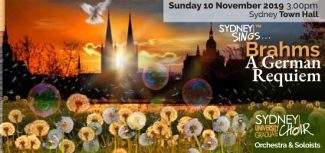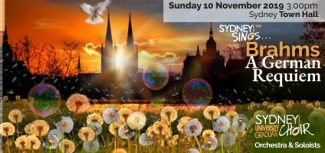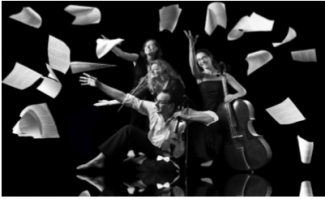Concert Review: Sydney Sings Brahms – A German Requiem/ Sydney University Graduate Choir and Guest Choir
 Sydney Sings Brahms- A German Requiem
Sydney Sings Brahms- A German Requiem
Sydney University Graduate Choir and Guest Choir/ Christopher Bowen OAM -conductor
Sydney Town Hall
10 November 2019
Written by Victoria Watson
Sydney University Graduate Choir was formed in the 1950s and has evolved in the decades since into a large ambitious ensemble of over one hundred voices. Christopher Bowen has been their chief conductor since 1992 and the largest scale projects under the banner Sydney Sings have been presented since 2007 with great success. The choir ranks are swelled as the projects are open to other singers who prepare over an intensive rehearsal period. Following on performances of Handel’s Messiah and Verdi’s great Requiem, the Brahms project is their first foray into German repertoire. Performed in German rather than Latin –the more common language of the Catholic mass. The work was performed with a full orchestra and two soloists – Simon Lobelson (baritone) and Amy Moore (soprano)
As a prelude to the mighty Requiem, the orchestra performed Brahms’ Tragic Overture Op. 81 (1880). A later work than the youthful beginnings of the Requiem (composed between 1856 and 1868), this overture was written as a contrasting piece to his bright favourite the Academic Festival Overture. The sombre mood is sustained throughout with rhythms that suggest the marching of fate and the darkness of tragedy as the title suggests. It was a good choice to set a mood of solemnity and contemplation in advance of the Requiem.
The large choir rose well to the many challenges. They managed the German language well overall and were at their best in the loud tutti homophonic sections . Christopher Bowen kept his forces together well in the many polyphonic and fugal sections. There was some inevitable imbalance across the parts as there are always fewer tenors in large choirs, but their section was clear and in pitch. At times, more legato line would have helped in exposed sections. The huge soprano section sounded fine in middle range and sang with strong dynamics. They were less comfortable in soft sustained or very high sections. The altos and basses, working closer to spoken range, balanced and blended well, especially given the many guest singers involved.
Soprano Amy Moore sang a beautifully ethereal Ihr hab nun traurigkeit ( You are now full of sadness). In this case it was well worth the wait till the fifth movement as her voice’s crystalline clarity soared over the orchestra with the deeply moving lines “I will comfort you as someone is comforted by their mother.”
The exemplary German diction of the baritone soloist Simon Lobelson set a high benchmark for expressiveness and clarity of text and intent. He established a very serious mood for the very different setting of The trumpet shall sound than the familiar optimism of Handel’s setting in Messiah. Brahms sets his sixth movement more amidst darkness and mystery than celebration of God’s glory. The brass section rings out ominously, recalling the fateful atmosphere of the Tragic Overture. When the choir takes over with “Death where is your sting-Hell where is your victory?” the German text works particularly well with the sharp onomatopoeia of Stachel ( sting)and Sieg ( victory) excellently conveyed by the choir.
The Brahms Requiem is less well-known or dramatic than those by Faure, Verdi or Mozart – but it is both a fine challenge for a large choir to explore and for an audience to appreciate. It was marvellous to hear it in the Sydney Town Hall where the acoustic allows for cathedral-like resonance.
SoundsLikeSydney©
A graduate of Melbourne university and VCA, Victoria Watson appeared regularly as a soprano with the Victoria State Opera and has toured and served as artistic director of many chamber ensembles.
She has performed with Sydney Symphony Orchestra and for ten years, was artistic director of a major opera education project with Opera Australia. Since 2015 she has moved into directing opera including Mozart’s Cosi Fan Tutte at the Independent theatre.
Victoria has lectured in voice at the major universities in Melbourne, and is currently a tutor at UNSW. Having taught at major Sydney secondary colleges, she now runs a busy private singing studio. She is a published author on opera and a popular freelance music and theatre lecturer and advocate for Australian artists around the world.







